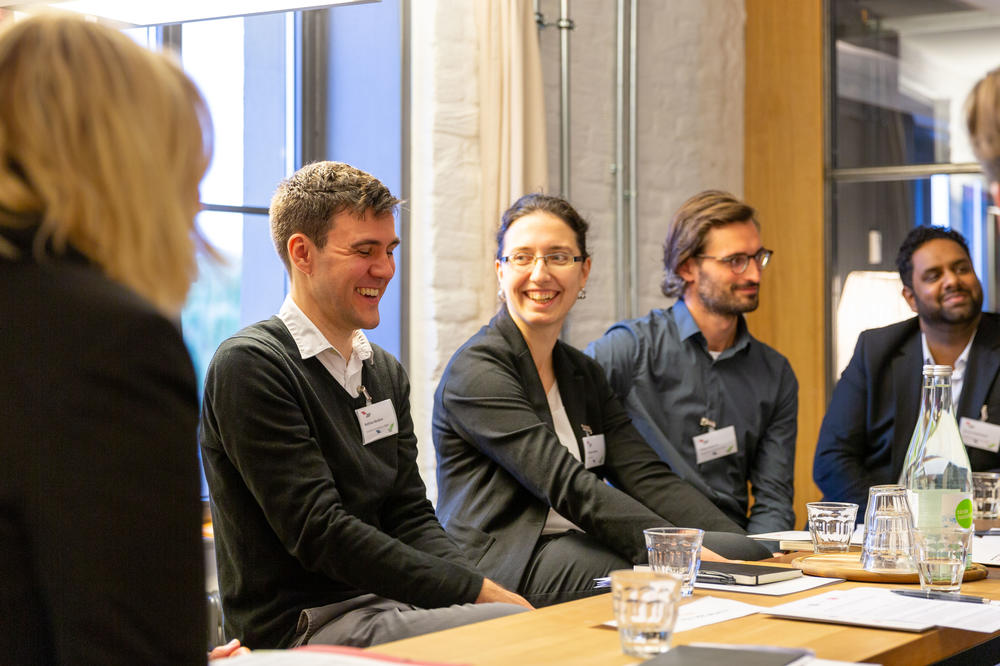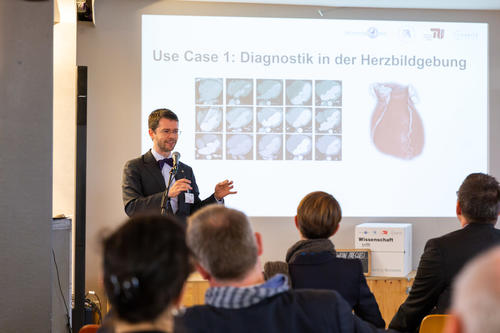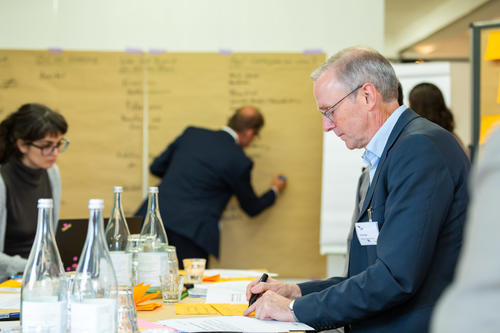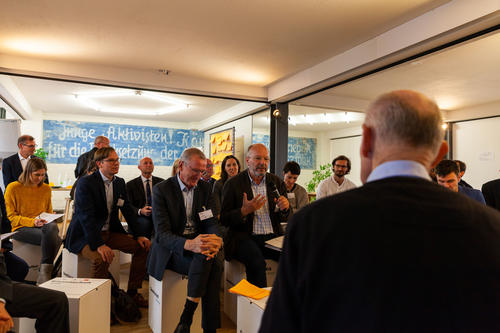Pre-Research Forum “New Health”
Ethics, digitalization, health – in a new event format Berlin researchers discuss issues with experts from various areas of society.
Jan 27, 2019
Participants of the first Pre-Research Forum in the Private Roof Club on October 25, 2018
Image Credit: Felix Noak
From the top floor of a former mill storehouse located directly at the East Side Gallery, you have a good view of the Berlin Oberbaum Bridge, which connects the two districts Kreuzberg and Friedrichshain. The venue on the River Spree offers an unusual perspective on the hustle and bustle of the city: from up there the people in the streets below look like tiny little dollhouse figures, constantly in motion.
This is what makes it such a good place to discuss ideas for solutions to the social challenges of the present and the future – and who better to do that than researchers and experts from politics, business, society, and culture. The Pre-Research Forum, which took place for the first time on October 25 and 26, 2018, is an innovative transdisciplinary format of the three major Berlin universities – Freie Universität Berlin, Humboldt-Universität zu Berlin, and Technische Universität Berlin – as well as Charité – Universitätsmedizin Berlin. The topic for discussion was the ethical challenges of digitalization in the health sector. “The major Berlin universities and Charité want to develop solutions to some of the most pressing issues of our time, in direct cooperation with other social stakeholders,” explains Audrey Podann, a postdoctoral political scientist and program manager on the Transdisciplinarity project, which was co-designed by the Pre-Research Forum under the direction of Professor Christine Ahrend, first vice president at Technische Universität Berlin.
Digitalization increasingly raises ethical questions. Most of these questions are not new, but they do need to be newly discussed and negotiated within the context of digitalization. In the health sector in particular, a broad social discussion that transcends the boundaries of single disciplines is necessary. For one and a half days, around 50 representatives from research, business, politics, culture, and society exchanged views on current challenges related to digitalization and together worked out specific areas where further research is needed.
Researchers from a wide variety of disciplines including medicine, ethics, mathematics, computer science, and health management from all three major universities and Charité were invited to propose potential topics. Specific case studies were then developed together with a project team at Technische Universität Berlin. Three of them made it into the program of the event: developments in automated diagnostics, data tracking in hospitals, and the use of nursing robots. These topics were presented by three researchers.
Prof. Dr. Marc Dewey of Charité presents the “automated diagnostics” use case in the Pre-Research Forum.
Image Credit: Felix Noak
Marc Dewey, Heisenberg Professor of Radiology at Charité, presented new developments in automated diagnostics in the field of cardiology, such as the evaluation of MRI images using artificial intelligence. The “second glance” by the machine supports doctors in coping with large numbers of vital results and thereby simplifies their work. According to Dewey, however, the protection of sensitive patient data is problematic, as is the issue of who is liable for possible diagnostic errors. Is it the doctor? Or the software manufacturer?
Professor Matthias Weidlich, a computer scientist at Humboldt-Universität zu Berlin, presented the practical case of data tracking in hospitals. By equipping patients with sensors to determine their whereabouts, processes in hospitals can be improved. Here too, however, questions of data protection and the protection of the personal privacy of patients arose – this was also discussed intensively in the workshop.
The third case study, presented by Matthias Rötting, a professor of human-machine systems at Technische Universität Berlin, dealt with the use of robots to assist elderly people in their home environments. Worldwide, the first attempts are already being made to support and relieve caring staff. “But how is this experienced by those in need of care?” asked Rötting. “Can robotic systems replace human contact?”
Using practical experience to generate new ideas for research
The participants of the Pre-Research Forum discussed these questions in three transdisciplinary research groups, each consisting of as many representatives as possible from different fields. This gave actors from society, politics, culture, and business an opportunity to discuss current research findings directly with researchers from their fields of work as well as to discuss possibilities for application.
It was also a chance for them to contribute practical ideas for new research. “I am astonished that people from different backgrounds speak or understand each other,” said Maria Christina Caldarola, a postdoctoral lawyer who is the managing director of the consulting firm CU3IC Consultancy. She continues, “However, I think this is a goal that universities should teach more because more of those people are necessary.”
Participants from research, business, politics, and civil society at the Pre-Research Forum on October 26, 2018
Image Credit: Felix Noak
Particular need for research in regard to dealing with data.
At the end, the participants identified three important areas in which, in their opinion, research should be stepped up in the future:
- Trust and acceptance: How do people experience the new technology? How can we ensure that society is better informed?
- Data acquisition and data protection: Which models of data trusteeship are safe and reliable? How can transparency and data security exist together?
- Technology and law: How can the right to self-determination – for example, the right not to know about one’s personal health situation – be preserved? What are the legal framework conditions for the use of robots in home environments?
“Our evaluation of the project not only confirms the great interest of all the participants, but also indicates that there is a need for a transdisciplinary approach to addressing socially relevant issues of the future and solving them together,” explained Professor Christine Ahrend. In a survey conducted after the event, all the participants – both from the research community and other areas of society – stated that the event had been worthwhile for them and that their expectations had been fulfilled. Almost everyone surveyed said they were also interested in future cooperation. In order to identify specific research needs, the positions jointly created in the research groups are to be worked out in further workshops in 2019.
The long-term goal of the new event format is to jointly develop new research questions that will lead to transdisciplinary projects. As Christine Ahrend explains, “Future events can also focus on other socially relevant topics which, due to their interdisciplinary character, can ideally only be dealt with in collaboration with other partners.”





